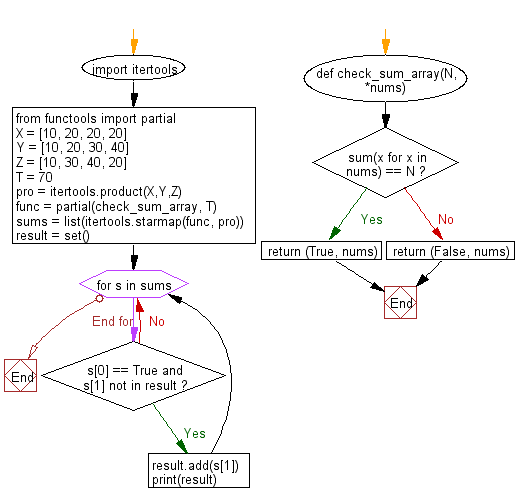Python: Check the sum of three elements from three arrays is equal to a target value
Three Array Sum Combinations
Write a Python program to check the sum of three elements (each from an array) from three arrays is equal to a target value. Print all those three-element combinations.
Sample data:
/*
X = [10, 20, 20, 20]
Y = [10, 20, 30, 40]
Z = [10, 30, 40, 20]
target = 70
*/
Sample Solution:
Python Code:
# Import the 'itertools' module for advanced iteration tools and 'partial' from 'functools'.
import itertools
from functools import partial
# Define three lists and a target sum value.
X = [10, 20, 20, 20]
Y = [10, 20, 30, 40]
Z = [10, 30, 40, 20]
T = 70
# Define a function to check if the sum of a set of numbers equals a given target.
def check_sum_array(N, *nums):
if sum(x for x in nums) == N:
return (True, nums)
else:
return (False, nums)
# Generate the Cartesian product of the three lists.
pro = itertools.product(X, Y, Z)
# Create a partial function using the 'check_sum_array' function and the target sum 'T'.
func = partial(check_sum_array, T)
# Use 'starmap' to apply the partial function to each element in the Cartesian product.
sums = list(itertools.starmap(func, pro))
# Use a set to store unique valid combinations.
result = set()
# Iterate through the sums and print unique valid combinations.
for s in sums:
if s[0] == True and s[1] not in result:
result.add(s[1])
print(result)
Sample Output:
{(10, 20, 40)}
{(10, 20, 40), (10, 30, 30)}
{(10, 20, 40), (10, 30, 30), (10, 40, 20)}
{(10, 20, 40), (10, 30, 30), (20, 10, 40), (10, 40, 20)}
{(10, 20, 40), (20, 20, 30), (10, 30, 30), (20, 10, 40), (10, 40, 20)}
{(10, 20, 40), (10, 40, 20), (20, 10, 40), (10, 30, 30), (20, 20, 30), (20, 30, 20)}
{(10, 20, 40), (10, 40, 20), (20, 10, 40), (20, 40, 10), (10, 30, 30), (20, 20, 30), (20, 30, 20)}
Explanation:
The above Python code tries to find unique combinations of elements from three lists (X, Y, Z) whose sum is equal to a target value T. Here's a brief explanation:
- Import the "itertools" module for advanced iteration and the "partial()" function from the "functools" module.
- Define three lists (X, Y, Z) and a target sum value (T).
- Define a function (check_sum_array) that checks if the sum of a set of numbers equals a given target.
- Generate the Cartesian product of the three lists (X, Y, Z).
- Create a partial function using the "check_sum_array()" function and the target sum T.
- Apply the partial function to each element in the Cartesian product using "starmap".
- Use a set (result) to store unique valid combinations.
- Iterate through the sums and print unique valid combinations.
Flowchart:

For more Practice: Solve these Related Problems:
- Write a Python program to find all combinations of one element from each of three arrays whose product equals a target value.
- Write a Python program to determine the combination of elements from three arrays whose sum is closest to a given target.
- Write a Python program to count the number of combinations of elements from three arrays that exactly sum to a target value.
- Write a Python program to print all unique three-element combinations (one from each array) that add up to a specific target.
Go to:
Previous: Write a Python program to display some information about the OS where the script is running.
Next: Write a Python program to create all possible permutations from a given collection of distinct numbers.
Python Code Editor :
Have another way to solve this solution? Contribute your code (and comments) through Disqus.
What is the difficulty level of this exercise?
Test your Programming skills with w3resource's quiz.
